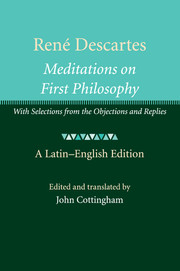Book contents
- Frontmatter
- Contents
- Philosophical introduction
- Editorial introduction
- Meditationes de prima philosophia
- Meditatio Prima: De iis quae in dubium revocari possunt
- Meditatio Secunda: De natura mentis humanae: quod ipsa sit notior quam corpus
- Meditatio Tertia: De Deo, quod existat
- Meditatio Quarta: De vero et falso
- Meditatio Quinta: De essentia rerum materialium; et iterum de Deo, quod existat
- Meditatio Sexta: De rerum materialium existentia, et reali mentis a corpore distinctione
- OBJECTIONES CUM RESPONSIONIBUS
- Index
Meditatio Sexta: De rerum materialium existentia, et reali mentis a corpore distinctione
Sixth Meditation: The existence of material things, and the real distinction between mind and body
Published online by Cambridge University Press: 05 May 2013
- Frontmatter
- Contents
- Philosophical introduction
- Editorial introduction
- Meditationes de prima philosophia
- Meditatio Prima: De iis quae in dubium revocari possunt
- Meditatio Secunda: De natura mentis humanae: quod ipsa sit notior quam corpus
- Meditatio Tertia: De Deo, quod existat
- Meditatio Quarta: De vero et falso
- Meditatio Quinta: De essentia rerum materialium; et iterum de Deo, quod existat
- Meditatio Sexta: De rerum materialium existentia, et reali mentis a corpore distinctione
- OBJECTIONES CUM RESPONSIONIBUS
- Index
Summary
Reliquum est ut examinem an res materiales existant. Et quidem jam ad minimum scio illas, quatenus sunt purae Matheseos objectum, posse existere, quandoquidem ipsas clare et distincte percipio. Non enim dubium est quin Deus sit capax ea omnia efficiendi quae ego sic percipiendi sum capax; nihilque unquam ab illo fieri non posse judicavi, nisi propter hoc quod illud a me distincte percipi repugnaret. Praeterea ex imaginandi facultate, qua me uti experior, dum circa res istas materiales versor, sequi videtur illas existere; nam attentius consideranti quidnam sit imaginatio, nihil aliud esse apparet quam quaedam applicatio facultatis cognoscitivae ad corpus ipsi intime praesens, ac proinde existens.
Quod ut planum fiat, primo examino differentiam quae est inter imaginationem et puram intellectionem. Nempe, exempli causa, cum triangulum imaginor, non tantum intelligo illud esse figuram tribus lineis comprehensam, sed simul etiam istas tres lineas tanquam praesentes acie mentis intueor, atque hoc est quod imaginari appello. Si vero de chiliogono velim cogitare, equidem aeque bene intelligo illud esse figuram constantem mille lateribus, ac intelligo triangulum esse figuram constantem tribus; sed non eodem modo illa mille latera imaginor, sive tanquam praesentia intueor. Et quamvis tunc, propter consuetudinem aliquid semper imaginandi, quoties de re corporea cogito, figuram forte aliquam confuse mihi repraesentem, patet tamen illam non esse chiliogonum, quia nulla in re est diversa ab ea quam mihi etiam repraesentarem, si de myriogono aliave quavis figura plurimorum laterum cogitarem; nec quicquam juvat ad eas proprietates, quibus chiliogonum ab aliis polygonis differt, agnoscendas. Si vero de pentagono quaestio sit, possum quidem ejus figuram intelligere, sicut figuram chiliogoni, absque ope imaginationis; sed possum etiam eandem imaginari, applicando scilicet aciem mentis ad ejus quinque latera, simulque ad aream iis contentam; et manifeste hic animadverto mihi pecu73liari quadam animi contentione opus esse ad imaginandum, qua non utor ad intelligendum: quae nova animi contentio differentiam inter imaginationem et intellectionem puram clare ostendit.
- Type
- Chapter
- Information
- René Descartes: Meditations on First PhilosophyWith Selections from the Objections and Replies, pp. 100 - 125Publisher: Cambridge University PressPrint publication year: 2013

